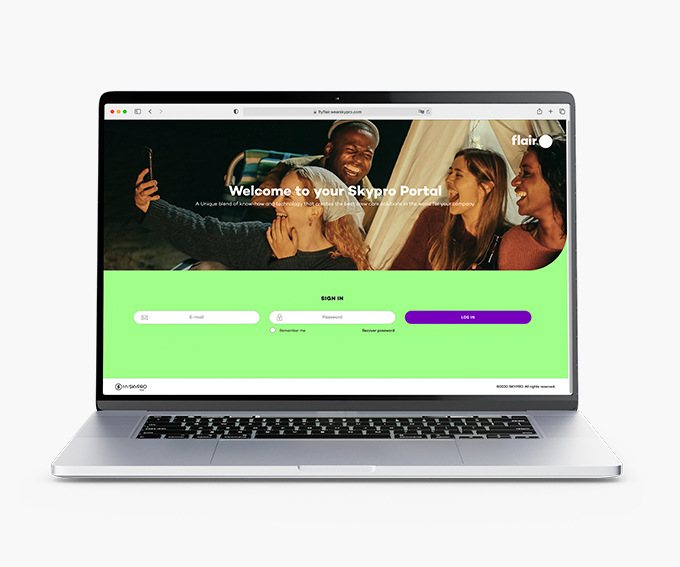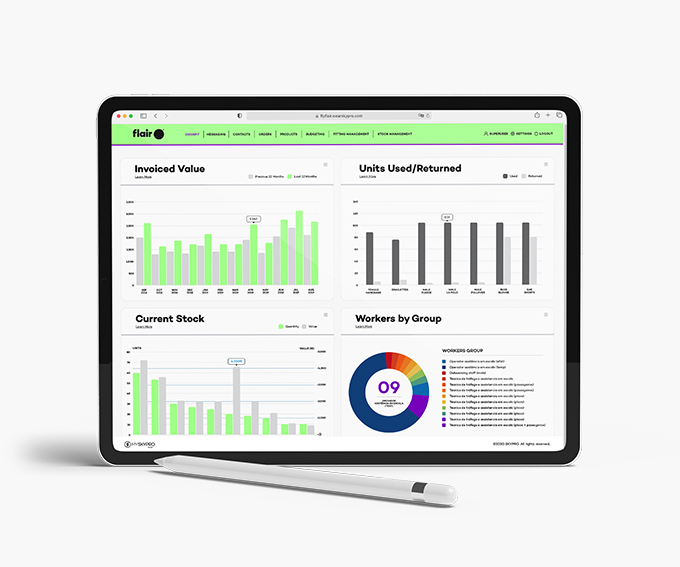The evolution does not stop, and new challenges arise every moment for the textile and uniforms industry segment. Although most of these obstacles are predictable, some surprises will demand more from our business—for example, automatization and diversity.
That market trend is impacting the present and future of industrial activities. Digitalization and inclusion became a matter of survival.
In this article, we will explore new challenges in the textile industry related to uniform production. We’ll reveal how Skypro uses AI technology to find new challenges solutions. We will also present the new internship between Skypro and Flair Airlines and how our software as a service, mySkypro Portal, solved the above issues with the Canadian airline.

When adopting and implementing software as a service
Flair is the first Canadian Low-Cost airline, and its mission is to make travel cheaper and affordable for all Canadians. They are an inclusive brand and allows their employees to wear clothes independent of gender. Women can wear males jackets, and the contrary is also allowed.
Despite the distance between Portugal and Canada, Flair turned to Skypro for the potential of managing uniforms at all stages. Above all, they knew we could deliver their uniforms as quickly as possible with high-quality and low price.
We presented strategic solution planning that contemplates the entire production chain of uniforms: suppliers, tailors, stock control, and other logistical processes. Also, we implemented our digital and inclusive inventory management methods and delivered the whole material with quality and agility.
How was this possible? Thanks to mySkypro Portal and its digital supply chain, it was possible to optimize the management of each product. It also allowed Flair Airlines to follow the step-by-step process of making its inclusive uniforms.
In this successful case, around 20 suppliers were involved in all stages of uniform production: design clothes, material, fitting, shoes and accessories until reaching the final product.
Sourcing of raw materials in stock was necessary. The choice and selection had to meet the customer’s requirements and expectations. Simultaneously, we were making molds and cutting plans. All consciously and with a circular and sustainable economy.
The day we saw the final product arriving at the warehouse was a significant effort and a sense of caring and belonging was entirely satisfactory!

How mySkypro Portal helped in the case of Flair Airlines
Automating production control reduces mistakes and failures.
Currently, mySkypro Portal brings specialized digital solutions for the uniform production sector. There is no reason to continue performing operations manually or through outdated software.
We ensure the right choice of suppliers that align with our partner’s values and needs. Always considering the delivery of excellence that our customers deserve.
Alternatively, It is possible to set the configuration and allow your crew to decide which clothes they want to wear—preserving Comfort and Well-Being, no matter their gender. It’s their choice.
Thus, investing the company’s money in technology is an initiative that presents excellent returns and guarantees a competitive advantage for the business. In this way, we delivered to Flair Airlines a practical, fast, economic, quality, and
successful result.
How Digitization in uniform production helps cut business costs
Rethinking strategic planning is essential to reposition the brand itself in this new scenario. Cutting costs is part of the strategy, and revising internal processes to make them more agile can result in savings. Decreasing warehouse space, also avoiding new purchases of raw materials is an intelligent action to preserve cash.
Inventory control methods represent a great challenge for many companies among the fundamental management processes for optimizing practices and results in economy-drive. They affect other areas of the company, such as finance, marketing, and sales. Therefore, the lack of stock control can result in significant losses.
In the uniform sector, suppose a company does not plan to replenish its stock on time. In that case, it may suffer from a lack of a specific material, and the uniform would be incomplete. On the other hand, buying excess items almost always results in stranding and financial loss. In most cases, a company can take a long to recover the capital invested in that mistaken request.










